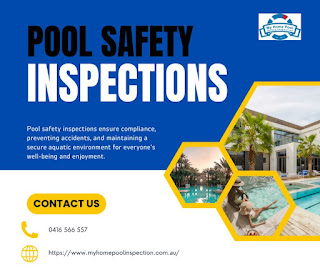Ensuring Pool Safety: A Comprehensive Guide to Pool Safety Inspections and Compliance
Introduction:
A backyard pool is often considered the epitome of relaxation and enjoyment, providing a refreshing escape during hot summer days. However, with the pleasure of having a private pool comes the responsibility of ensuring its safety. In recent years, pool safety has gained paramount importance, leading to the emergence of specialized professionals like pool safety inspectors. This article delves into the crucial aspects of pool safety inspections, compliance, and the significance of maintaining pool barrier safety, with a focus on pool fence safety.
 |
| Swimming Pool and Spa Safety |
Pool Safety Inspector:
The Guardian of Pool Safety:
The role of a pool safety inspector cannot be overstated when it comes to maintaining a secure swimming environment. A pool safety inspector is a trained professional responsible for assessing pools to ensure they comply with the relevant safety standards and regulations. These inspectors play a crucial role in preventing accidents and promoting responsible pool ownership.
Pool Safety Compliances:
Pool safety compliances refer to the set of rules, standards, and regulations established to ensure the safety of individuals using or around swimming pools. Compliance is essential to prevent accidents, injuries, and even fatalities. Regulations may vary by region, but common elements include proper fencing, gate mechanisms, pool covers, and warning signs.
When it comes to pool safety compliances, it is imperative for pool owners to be aware of and adhere to the specific regulations in their area. This may involve regular inspections to confirm that the pool and its surrounding structures meet the required standards. Hiring a certified pool safety inspector is often the most reliable way to ensure compliance and avoid potential legal repercussions.
One of the critical components of pool safety is the installation and maintenance of effective pool barriers. Pool barriers act as the first line of defense, preventing unauthorized access and reducing the risk of accidents, particularly involving young children. The purpose of pool barrier safety is to create a secure boundary that restricts entry to the pool area, minimizing the potential for drowning incidents.
Pool fences are a common and effective form of pool barrier. These fences are designed to be climb-resistant and have self-closing and self-latching gates to ensure that the pool remains inaccessible when not in use. The height, materials, and construction of the fence are usually regulated to meet specific safety standards.
Pool Fence Safety:
Pool fence safety is a crucial aspect of overall pool safety. A well-designed and properly installed pool fence acts as a reliable barrier to keep children and pets away from the pool area when unsupervised. Here are some key considerations for ensuring pool fence safety:
Height and Construction:
- The construction of the fence should be sturdy and durable, using materials that withstand outdoor conditions.
- Pool fences should meet specific height requirements to prevent climbing. The recommended height often varies, but it is typically around 4 feet or higher.
- Gates and Latches:
- Gates should be self-closing and self-latching to ensure they automatically close behind individuals entering or exiting the pool area.
- The latch should be positioned out of reach of young children and should require a deliberate action to open.
- Clearance and Visibility:
- Ensure that there is minimal clearance between the bottom of the fence and the ground to prevent small animals from entering.
- The fence should not provide easy footholds for climbing, and any decorative elements should not compromise visibility.
Regular Inspections and Maintenance:
- Regularly inspect the pool fence for any damage or wear and tear.
- Address any issues promptly to maintain the integrity and effectiveness of the barrier.
In conclusion, pool safety is a multifaceted responsibility that involves adherence to safety compliances, regular inspections, and a particular focus on pool barrier safety, especially pool fence safety. Pool owners must recognize the significance of maintaining a secure environment to prevent accidents and tragedies. Engaging the services of a qualified pool safety inspector is a proactive step toward ensuring compliance with regulations and, most importantly, safeguarding the well-being of those enjoying the pool. By prioritizing pool safety, individuals can continue to enjoy the pleasures of a private pool with peace of mind.



Comments
Post a Comment